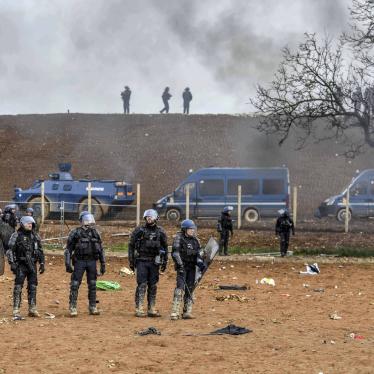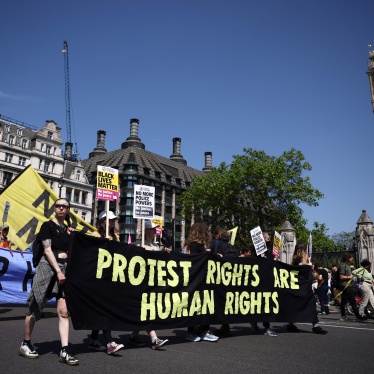As the climate crisis accelerates, some European governments are seeking to silence groups that are trying to raise the alarm.
Scientists have linked extreme weather events like excessive heat, flooding and wildfires to big emitter states’ failure to take urgent climate action despite the dangers posed to the rights of those living there and around the world.
Governments worldwide are breaking electoral promises, defying court decisions over their lack of climate action, and ignoring warnings that have been voiced by international bodies for years.
No major emitter country has decarbonised enough to meet the 2015 Paris climate agreement goals.
In response, climate activists are using protests, campaigning and civil disobedience to try to focus public debate and spur urgent state action on phasing out of fossil fuels and protecting carbon sinks like forests.
In turn, some European states have reacted with heavy-handed policing, and by effectively criminalising such activism, seeking to dissolve groups, imposing restrictions on protests, and conducting smear campaigns. This creates serious risks to environmental activism and civil society as a whole and undercuts vital efforts to address the climate crisis.
In Germany, there has been a harsh response to high-visibility climate activism, with a particularly severe approach toward the group Last Generation, whose civil disobedience has included damaging private property, such as spraying paint on private jets and damaging art frames. Five Last Generation activists were indicted in May for forming a criminal organisation, and in June prosecuting authorities indicted a sixth climate activist under the same charges.
A ruling that deems Last Generation a criminal organisation could pave the way for prosecuting anyone who participates in or supports the group, whether administratively or financially, and would mean criminal sanctions well beyond anything the activists should reasonably and foreseeably expect to face.
Meanwhile, French environmental defenders have been arrested on anti-terrorist grounds and subjected to stigmatising investigations. Last year, the French government attempted by decree to dissolve an environmental collective engaging in civil disobedience. Although France’s highest administrative court overturned the dissolution in November as a violation of freedom of association, such actions by authorities can still have a chilling effect on other climate activists, who may fear arrest and prosecution.
Legislation introduced in the UK in 2022 criminalises peaceful protest, increasingly obstructs environmental movements and makes civil disobedience risky for activists and members of the public. Over-policing stifles peaceful protest, and journalists covering direct actions, such as the Just Stop Oil protests, have themselves been arrested.
Human rights law protects the right to peaceful protest. International law also recognises peaceful, nonviolent civil disobedience as a legitimate form of assembly. Disruptions like traffic blockades, while inconvenient, generally do not constitute violence under international standards, although damage to or destruction of private or public property may. Authorities may impose conditions or restrictions on demonstrations but under international law they must be proportionate, weighing the public interest at stake, to determine whether less restrictive conditions could achieve the same result. Likewise, punishments for civil disobedience must be proportionate so they cannot be used to silence dissent or deter individuals from exercising their right to protest.
The UN expert on environmental defenders under the Aarhus Convention, a multilateral environmental agreement, Michel Forst, has noted a “disproportionate response to peaceful civil disobedience” together with actions to “severely restrict legal forms of environmental protest” citing many examples in Europe. He called it “a major threat to democracy and human rights”.
Governments often prioritise short-term political gains over long-term solutions due to the influence of fossil fuel lobbies, structural challenges, and the short-term focus of political cycles. Addressing climate issues requires a long-term political agenda that goes beyond legislative terms. Governments should recognise the importance of addressing climate change to realise socio-economic rights and align with the demands of the public majority to further climate protection efforts.
In this context, civil society plays a crucial role in pushing more ambitious climate policymaking. It can draw media attention, put pressure on policymakers, engage in climate litigation and shift public opinion towards climate action.
Activists, concerned by climate inaction, are resorting to civil disobedience as a last resort to influence political decisions. They accept the risk of criminal consequences for their activism while engaging in actions that include blocking roads, bridges, and airports, disrupting sporting events, occupying forests, spray painting or smearing food on monuments and art pieces, all in an effort to spur decisive political action.
Governments including those in Germany, France and the UK, should refrain from and repeal laws obstructing and criminalising non-violent civil disobedience of climate activists, ensuring the preservation of civil society space for environmental protest and activism.
Governments need to balance the duty to maintain public order with recognition of the legitimate and protected role of civil society, and in particular why diverse climate activism is key to driving climate progress. They should focus on addressing the climate crisis rather than silencing activists.










